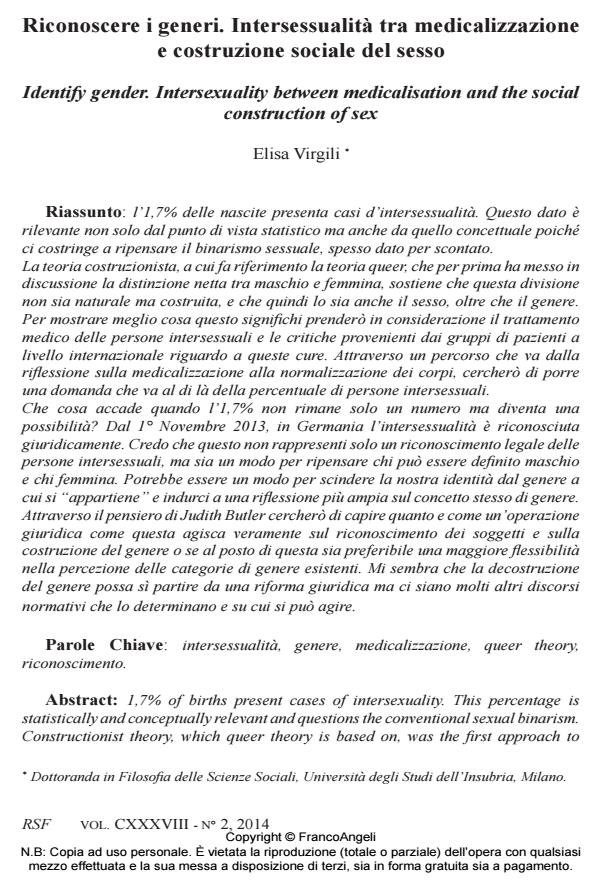Identify gender. Intersexuality between medicalisation and the social construction of sex
Journal title RIVISTA SPERIMENTALE DI FRENIATRIA
Author/s Elisa Virgili
Publishing Year 2014 Issue 2014/2
Language Italian Pages 16 P. 113-128 File size 1625 KB
DOI 10.3280/RSF2014-002008
DOI is like a bar code for intellectual property: to have more infomation
click here
Below, you can see the article first page
If you want to buy this article in PDF format, you can do it, following the instructions to buy download credits

FrancoAngeli is member of Publishers International Linking Association, Inc (PILA), a not-for-profit association which run the CrossRef service enabling links to and from online scholarly content.
1,7% of births present cases of intersexuality. This percentage is statistically and conceptually relevant and questions the conventional sexual binarism. Constructionist theory, which queer theory is based on, was the first approach to gender distinctions are not natural, but are socially constructed. To explain what this means the author presents the opinions of patients - taken on a international level - on medical therapy of intersexual people. Examining medicalisation and the concept of normalisation of the body the author then raises a question that transcends the statistical data on intersexual people. What happens when 1,7 % does not only represent a proportion or a number, but sets an option? Since November 2013 Germany has legally recognised intersex. This step does not only constitute a legal recognition of intersexual people, but offers also an opportunity to reconsider which individual is defined male or female. This step could also loosen the connection between gender and identity and lead us to a deeper understanding of the concept of gender. Inspired by Judith Butler’s thoughts the author raises a question: the recent legal recognition of intersex facilitates subject recognition and gender construction, or a greater flexibility in the perception of the existing gender categories might be preferable? The author considers that legal reform enhances gender deconstruction, but adds however that many other normative discourses - which impact on gender deconstruction - should be acted upon.
Keywords: Intersex, gender, medicalisation, queer theory, recognition
Elisa Virgili, Riconoscere i generi. Intersessualità tra medicalizzazione e costruzione sociale del sesso in "RIVISTA SPERIMENTALE DI FRENIATRIA" 2/2014, pp 113-128, DOI: 10.3280/RSF2014-002008